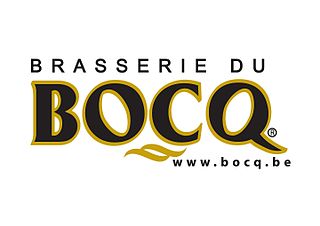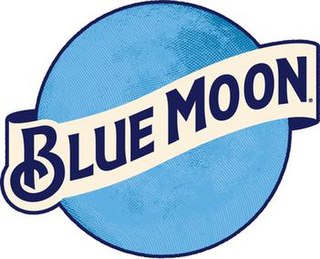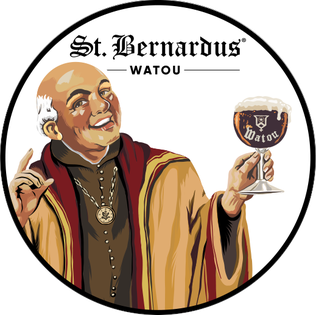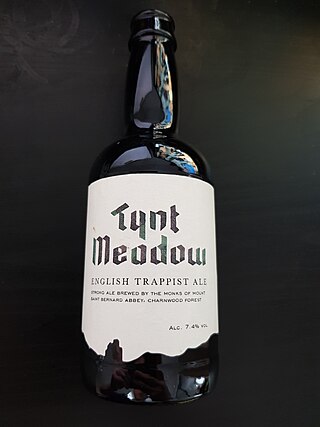
Leffe is a beer brand owned by InBev Belgium, the European operating arm of the global Anheuser–Busch InBev brewery giant. There are several beers in the range, and they are marketed as abbey beers. They are brewed in large quantities and are widely distributed.

Trappist beer is brewed by Trappist monks. Thirteen Trappist monasteries—six in Belgium, two in the Netherlands, and one each in Austria, Italy, England, France, and Spain—currently produce beer, but the Authentic Trappist Product label is assigned by the International Trappist Association (ITA) to just ten breweries which meet their strict criteria. As of 2021, Achel is no longer recognized as a Trappist brewery because it does not have any living monks.

Duvel Moortgat Brewery is a Flemish family-controlled brewery founded in 1871 in Antwerp Province, Belgium. Its strong golden pale ale, Duvel, is exported to more than forty countries. Duvel is Brabantian, Ghent and Antwerp dialect for devil, the standard Dutch word being duivel. Other popular beers include Maredsous and Vedett.

Chimay Brewery is a brewery at Scourmont Abbey, a Trappist monastery in Chimay, Hainaut, Belgium, one of the thirteen breweries worldwide that produce Trappist beer. They make four ales: Chimay Rouge, Chimay Bleue, Chimay Blanche, and Chimay 150; and one patersbier for the monks. The monastery also makes four varieties of cheese.

Westmalle Brewery is a Trappist brewery in the Westmalle Abbey, Belgium. It produces three beers, designated as Trappist beer by the International Trappist Association. Westmalle Tripel is credited with being the first golden strong pale ale to use the term Tripel.

Beer in Belgium includes pale ales, lambics, Flemish red ales, sour brown ales, strong ales and stouts. In 2018, there were 304 breweries in Belgium, including international companies, such as AB InBev, and traditional breweries, such as Trappist monasteries. On average, Belgians drink 68 litres of beer each year, down from around 200 each year in 1900. Most beers are bought or served in bottles, rather than cans, and almost every beer has its own branded, sometimes uniquely shaped, glass. In 2016, UNESCO inscribed Belgian beer culture on their list of the intangible cultural heritage of humanity.
The term dubbel is a Belgian Trappist beer naming convention. The origin of the dubbel was a strong version of a brown beer brewed in Westmalle Abbey in 1856, which is known to have been on sale to the public by June 1861. In 1926, the recipe was changed, and it was sold as Dubbel Bruin. Following World War Two, abbey beers became popular in Belgium and the name "dubbel" was used by several breweries for commercial purposes.

De Koningshoeven Brewery (Brouwerij de Koningshoeven) is a Dutch Trappist brewery founded in 1884 within the walls of Koningshoeven Abbey in Berkel-Enschot (near Tilburg).

The Brasserie du Bocq is a Belgian family brewery founded in 1858 by Martin Belot. It is based in the valley of the small river Bocq in Purnode.

Blue Moon Belgian White is a Belgian-style witbier brewed by Molson Coors under the name the Blue Moon Brewing Co. It was launched in 1995, and was originally brewed in Golden, Colorado.

Beer in the United Kingdom has a long history, and has quite distinct traditions. Historically the main styles were top-fermented Bitters, Porters, Stouts and Milds, but after World War II lagers took over half the market by volume. The Campaign for Real Ale (CAMRA) was founded in 1971 and has encouraged the preservation and revival of traditional styles of ale. In particular CAMRA has promoted cask conditioned beer, which completes its maturation in casks in the cellar of the pub rather than at the brewery. As of 2014 the UK drank 634 million imperial pints of cask ale, representing 60% of ale in pubs and restaurants and 17% of all beer in pubs. In total 42.42 million hectolitres of beer were produced in 2013 of which 48% was sold in the off-trade.

St. Bernardus is a brewery in Watou, Belgium.
Heineken N.V. is a Dutch brewer which owns a worldwide portfolio of over 170 beer brands, mainly pale lager, though some other beer styles are produced. The two largest brands are Heineken and Tecate; though the portfolio includes Amstel, Fosters, Sagres, Cruzcampo, Skopsko, Affligem, Żywiec, Starobrno, Zagorka, Zlatý Bažant, Laško and Birra Moretti.

La Binchoise is a beer brewery in Binche, Belgium. The brewery was founded in 1986 by husband and wife Graux-Jauson, unemployed at the time. They set up their business at home, but soon moved to the building of an old malthouse and quickly achieved commercial success, gaining a gold medal at the annual beer festival in Chicago. For a while their beer was made in a cauldron formerly owned by the Belgian National Guard. Their beers are refermented in the bottle.

Tripel is a term used by brewers mainly in the Low Countries, some other European countries, and the U.S. to describe a strong pale ale, loosely in the style of Westmalle Tripel. The origin of the term is unknown, though the main theory is that it indicates strength in some way. It was used in 1956 by the Trappist brewery, Westmalle, to rename the strongest beer in their range, though both the term Tripel and the style of beer associated with the name, were in existence before 1956. The style of Westmalle's Tripel and the name was widely copied by the breweries of Belgium, and in 1987 another Trappist brewery, the Koningshoeven in the Netherlands, expanded their range with a beer called La Trappe Tripel, though they also produced a stronger beer they termed La Trappe Quadrupel. The term spread to the U.S. and other countries, and is applied by a range of secular brewers to a strong pale ale in the style of Westmalle Tripel.

The St. Feuillien Brewery is a Belgian brewery in Le Roeulx, Belgium, which was founded in 1873. The brewery, which makes abbey-style beer, has been operated by the Friart family all this time, except for an 11-year hiatus that ended in 1998. Beers brewed by St. Feuillien include a brown ale ("brune") and a tripel, the latter of which praised as one of the best tripels available. A recent addition to their selection is a saison, "which has grown steadily to be up with the best". In 2016, the brewery launched an IPA called Belgian Coast.

Most beer sold in France is pilsner lager, mass-produced by major breweries which control over 90% of the market, although there are also traditional beer styles, such as top-fermented Bière de Garde, and a number of microbreweries.

Fort Collins Brewery (FCB) was a craft beer brewery located in Fort Collins, Colorado.

Bourgogne des Flandres is a Belgian beer brewed by Timmermans Brewery in Itterbeek in the municipality of Dilbeek which is located in Flemish Brabant.

Tynt Meadow is an English Trappist beer with an alcohol content of 7.4%. It is brewed at Mount St Bernard Abbey in Leicestershire.



















